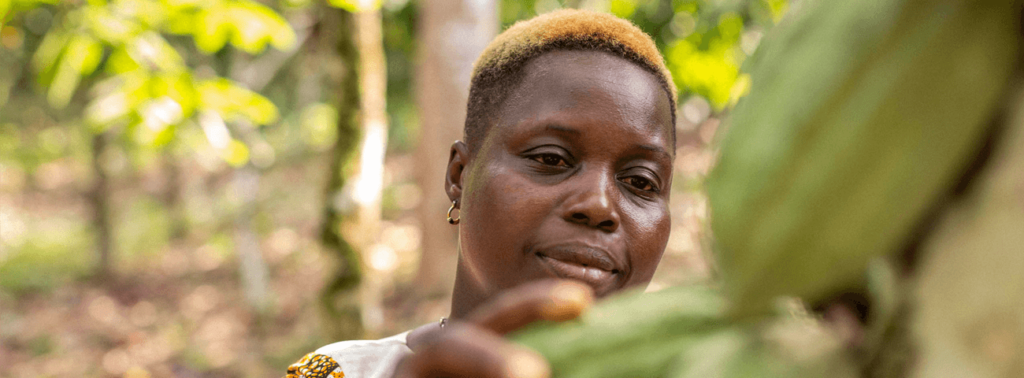Rosine Bekoin is a smallholder cocoa farmer and member of CAYAT co-operative in Côte d’Ivoire.
Rosine is slightly unusual as cocoa farmers in Côte d’Ivoire go – because she owns and runs her 2.5-hectare farm, which was passed to her from her mother. Normally it is men who own farms and earn the income from them.
I’ve seen that Fairtrade has helped us a lot in cocoa farming. The Fairtrade Premium has enabled us to do many things, especially women. It has enabled us to advance our children, and also we use the Fairtrade Premium to build for the future.
Rosine, cocoa farmer
Rosine used to sell her cocoa to local middlemen (pisteurs), who come to buy cocoa from individual farms at harvest time. But it was difficult to get close to a decent income working and trading in that way. A nearby co-operative, CAYAT, held a meeting about Fairtrade in Rosine’s village, which convinced her that uniting with other farmers would actually make her more autonomous and independent.
Benefits of Fairtrade
Rosine first sold her cocoa as Fairtrade in 2016. Having received training in quality and good agricultural practices from CAYAT, her production increased by 50 percent from 1 tonne in 2017 to 1.5 tonnes in 2018. This was a welcome boost to her income since the price cocoa farmers received dropped by 30-40 percent in 2016 and in 2017, and still hadn’t recovered in 2018.
Rosine plans to build a house with the increased income that she has earned through selling her cocoa as Fairtrade. CAYAT also operate a subsidised hardware store in town, funded by Fairtrade Premium, so that locals can access building materials and equipment at an affordable price.
Women are important
Rosine is the Secretary of her co-operative’s Women’s Society, and is a graduate from the Fairtrade Africa Women’s School of Leadership. There, she picked up lots of skills and ideas to share with other women in the co-operative to improve their situation. She believes firmly in the power of women to play a key role bringing communities out of poverty.
One way the importance of women is clear is in the income diversification projects Rosine, and over 400 other women in the society, have invested their Fairtrade Premium in. They are mainly growing other food crops like cassava, aubergines and bananas, as well as raising chickens, but have many more plans too. These projects provide an independent income that supplements the income from cocoa so they can meet vital costs they face all-year round, like schooling.
‘Diversification is important; having cassava, chilli, bananas in the field brings us a lot of revenue. This benefits the children, because outside of the cocoa harvesting season, when the income isn’t there, it’s the women who have sold other things who contribute to the family income to pay for school fees.’
As a smallholder cocoa farmer, your net income depends not only on what you receive, but also on your outgoings – i.e. how much it costs you to grow cocoa, and other crops.
And so CAYAT farmers have benefitted from the women’s chicken-rearing project too. The women are able to produce natural, organic fertilizer each month from the chickens, which is sold to farmers for about £1.40 per bag to use on their farms. This is a big discount on the market rate of £24 per bag.
The future
We want everyone amongst us to see our freedom, to see we have our own houses. We want to build decent-sized houses that we can sleep peacefully inside, with our husband and children.
Rosine is rightly proud of the changes she and her fellow farmers are already bringing about thanks to Fairtrade, and their own courage and hard work. But she also knows how far there is to go, and nevertheless has big plans:
‘There’s a song that we sing in the fields that says we are standing up and working for the future of our children. Because it’s they who will come after us… Why can’t a female producer be the President one day? We can do it.’
